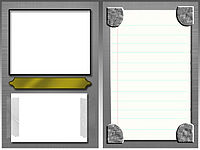Civic Intelligence RPG
Contents
Civic Intelligence RPG
Peak oil has long passed. The modern convenience that cheap fossil fuel once afforded is harder and harder to maintain. Politicians have failed to adjust government to be of any use to the citizens living in a world falling apart at the seams. In this game players take on the role of citizens of a small city working together to build a sustainable future.
Authors
- Karl Determeyer
- Michael O'Neill
- Amber Pecolatto
- Michael Phillips
- Vera Rankis
- Morgan Reisdorfer
Game Rules
Set Up
- Each player chooses a Character and collects the number of colored action tokens corresponding with their networking skill and character color.
- The Project Cards are shuffled face down and six are drawn and placed in the Current Project section of the board.
- The Community Sustainability Meter is set at two hours to midnight (bad, but not dire).
- The action cards are shuffled and each player draws five.
- The player with the most letters in their last name will go first and play will continue counter-clockwise.
Game Turns
- At the start of each player turn they draw an action card
- Each player, in turn, spends their available action points to:
- Join a project
- Leave a project
- Roll to work on a project task
- Play an action card
- If a project scenario is completed it is moved to the Completed Project section of the board and a new Active Project is drawn.
- After all players have spent their action points a turn counter is placed on all active projects.
- Any project scenario that reaches its turn limit is moved to the Failed Project section of the board.
- The Community Sustainability Meter is adjusted based on Active, Completed, and Failed projects.
The game ends if Sustainability is reached and maintained for two additional turns, or the meter reaches midnight.
Characters
- Single parent
- College student
- Grade schoolers
- Senior citizen
- Doctor
- Small business owner
- Teacher
- War Vet
Character Skills
- Organization/Planning
- Communication/Leadership
- Community currency
- Networking
Project Scenarios
We imagine that the Project Scenarios can span a vast array of possible events that a community or city could face. The list of project scenarios that we have chosen is by no means exhaustive, but we believe that it encompasses enough to make the game realistic and fun to play again.
Action Cards
Action Cards are fairly self-explanatory, they are actions that a citizen would take. The action cards are to be used by the players to help them finish the project scenarios.
- Buy a Prius or a Volt
- Volunteer at a food bank
- Buy Girl Scout cookies
- Work or build a community garden
- Babysit for a friend
- Raise money for the local animal shelter
- Start a community recycling program
Early Development Notes
Board areas
- City hall
- Elementary School
- College
- Downtown
- Non-profit org. headquarters
- Hospital
- Housing development (the projects)
- Suburbia
- Forest/wetlands/undeveloped nature
- Industrial area
- Waste management
- Church
"Team Sofa King Awesome" (how is this not a great name?) is interested in designing a role playing game. Some of the examples mentioned were:
Moving Towards a Civic Community In our first brainstorming session we envisioned some of the elements of the game we might design:
- Character Sheets - a number of different roles within a community. Each character could have
- Attributes
- Personal Goals
- Flavor Text
- Scenarios - these would drive the game by giving the characters something to work towards
- each scenario might have multiple phases
- each phase could impose a limited number of turns to be completed in
- Other game elements
- Resources
- Influence
We agreed to meet an hour before class next Wednesday to play Mansions of Madness
Here are some more ideas about the game:
This is from Doug's Paper
- Orientation - describes the purpose, principles and perspectives that help energize an effective deployment of civic intelligence.
- Organization- refers to the structures, methods and roles by which people engage in civic intelligence.
- Engagement - refers to the ways in which civic intelligence is an active force for thought, action, and social change. #Intelligence - refers to the ways that civic intelligence lives up to its name.
- Products and Projects - refers to some of the outcomes, both long-term and incremental, that civic intelligence might produce.
- Resources - refers to the types of support that people and institutions engaged in civic intelligence work need.
We might be able to incorporate these into the game as steps for the scenarios to follow.
I also thought we could frame our game around one overarching scenario or some big picture issue that would take Civic Intelligence to solve. One thing that came to mind was Peak Oil leading to industrial collapse and the challenge the players would be faced with would be to work together to save their local community. If we go with something like this we could look at the Transition Network as a resource to see what that organization is doing to promote Civic Intelligence in a sustainability context.

